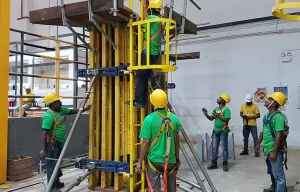Permablitz (noun): An informal gathering where a minimum of two individuals converge to accomplish the following: establish or enhance edible gardens, exchange skills related to permaculture and sustainable living, foster community, and revel in the experience.
My arrival at the Farmer’s Yard, a nexus of permaculture, a hostel, and a communal haven in Canggu, reveals a diverse assembly – a fusion of globetrotters and Balinese locals. They are diligently sowing beans and cucumbers in designated garden plots and adding final touches to a recently constructed chicken coop. embracing the ethos of “halting thoughtless tourism,” this space is founded on sustainable living principles, aiming to connect Bali’s visitors with the local fabric. The thriving garden, adorned with peppermint, eggplant, basil, cabbage, and rosella, was birthed during a permablitz. I’m here to meet Djuka Terenzi, a prime mover of Permablitz Bali, along with his compatriots.
Originating as a direct-action ‘green’ movement in Australia, permablitz seamlessly melds “perma” culture theory with the vigor of a ‘blitz’ – a sudden, energetic, and concerted effort. Essentially, these day-long convocations fuse volunteer labour and permaculture theory with the mission of transforming lacklustre backyard gardens or urban spaces into flourishing, productive havens. The concept is straightforward:
- A permaculture designer devises a site-specific plan.
- Volunteers contribute their labour.
- The host provides a communal lunch.
Beyond its community-building aspect, participating in a permablitz imparts the know-how of cultivating one’s food using basic permaculture principles. The network thrives on reciprocity, rewarding attendees with their permeability after contributing to several. It’s an inclusive affair where everyone is welcome, and everyone emerges victorious.
This concept sprouted in the Melbourne suburbs in 2006 when permaculture designer Dan Palmer joined forces with a South American community group. The collaborative effort infused seedlings, compost, plants, and ideas from Palmer’s side, while the community group contributed labour, delectable food, music, and dance. By day’s end, a mundane backyard had metamorphosed into a vibrant space boasting a worm farm, pond, vegetable plants, herbs, and chilies. The seeds of the permablitz movement were sown that day, spreading organically from Melbourne across Australia and reaching global destinations like Hawaii, Istanbul, Montreal, Uganda, and, naturally, Bali – where the inaugural permablitz unfolded at Sunrise School.
This network has successfully revitalized various gardens, including Terenzi’s and the Farmer’s Yard Hostel. Terenzi emphasizes that these free, day-long events are open to all, striving to create something ‘cool and efficient.’ A chosen site, a devised plan, a set date, and an announcement on their Facebook page set the stage. Besides crafting edible gardens, these gatherings may feature workshops on composting or water filtration, live music, and abundant laughter.
Permaculture, at its core, is about emulating nature – integrating people and places into ecologically harmonious systems that cater to the needs of the residents, providing essentials like water, vegetables, fruit, and eggs. At the same time, most gardens adhered to permaculture principles before industrialization; intensive farming, consumer demand for cheap produce, and urbanization led people away from this natural way of life. Perm blitzes serve as a means to reconnect with the land, offering first-time gardeners an opportunity to acquire valuable skills. As Djuka puts it, “We are not just using energy, but creating it.” It’s about super efficiency, about establishing a self-sustaining ecosystem. Edible gardens play a vital role in conserving energy by reducing the need for food transport, utilizing less water than agricultural farms, promoting composting, and adhering to organic practices.
Eager to explore more permeability sites, I venture to Kaleidoscope House, a vibrantly collared community hub on the outskirts of Ubud. Adorned with yellow and green brick walls draped in psychedelic wall hangings, this space serves as a canvas for communal gatherings. Inside, a yoga class is in full swing, while a room at the back houses bunk beds for volunteers and visitors. Stepping into the backyard, I encounter a nursery teeming with robust seedlings, a garden bed lined with recycled roof tiles, and an array of herbs, miniature cherry tomatoes, and water spinach thriving in a watery pot. Kaleidoscope, doubling as a Community House, acts as the headquarters for Rumah Idea (Indonesian Development of Environmental Education and Agricultural Studies), a foundation engaging with local youth, imparting knowledge in English, organic farming, beekeeping, chocolate-making, and dance.
Back in the living room, savouring a delightful organic Balinese coffee infused with cardamom, cinnamon, and cloves, my gaze fixates on a sign on the wall, encapsulating the essence of the Permaculture Living Bali: “Some want it to happen, some wish it would happen, others make it happen.”





